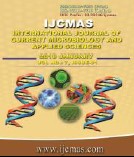


 National Academy of Agricultural Sciences (NAAS)
National Academy of Agricultural Sciences (NAAS)

|
PRINT ISSN : 2319-7692
Online ISSN : 2319-7706 Issues : 12 per year Publisher : Excellent Publishers Email : editorijcmas@gmail.com / submit@ijcmas.com Editor-in-chief: Dr.M.Prakash Index Copernicus ICV 2018: 95.39 NAAS RATING 2020: 5.38 |
Maize (Zea maize) is the 3rd most important cereal world in the world following wheat, rice. It is grown mainly in the semi- arid areas of the tropics and subtropics. Rice (Oryza sativa) is one of the main staples in the world and is cultivated mainly in Asia, Africa, and Latin America. The exogenous application of sodium nitroprusside (SNP), a NO donor, significantly alleviated the oxidative damage of salinity in seedlings of rice enhanced the seedlings growth and increased the dry weight of maize seedlings. In this paper we discus about Plant Nitric Oxide, because now days the plant tolerate the various types of stresses like salt stress, drought stress, cold stress and oxidative stress also. Nitric oxide (NO), a free radical in living organisms, is considered a phytohormone and a key signalling molecule functioning in various physiological processes of plants. These physiological processes include germination, growth, senescence, and photosynthesis as well as response mechanisms to specific environmental stresses. Plants under salt stress conditions experience oxidative and nitrosative stress; the latter mainly elicited by regulation of NO production. Nitrosative stress describes the molecular or cellular damage promoted by imbalance in NO homeostasis and other reactive nitrogen species. Additionally, depending on its concentration and location in plant cells or tissues, NO might function as an antioxidant and scavenge some other reactive intermediates. Direct or indirect involvement of NO in response mechanisms under water stress, drought, salinity, heavy metal stress, high or low temperature extremities, and ultraviolet radiation has been reported. In this work, the recent findings and current knowledge on the function of NO in plants under salt stress conditions are reviewed briefly.
 |
 |
 |
 |
 |